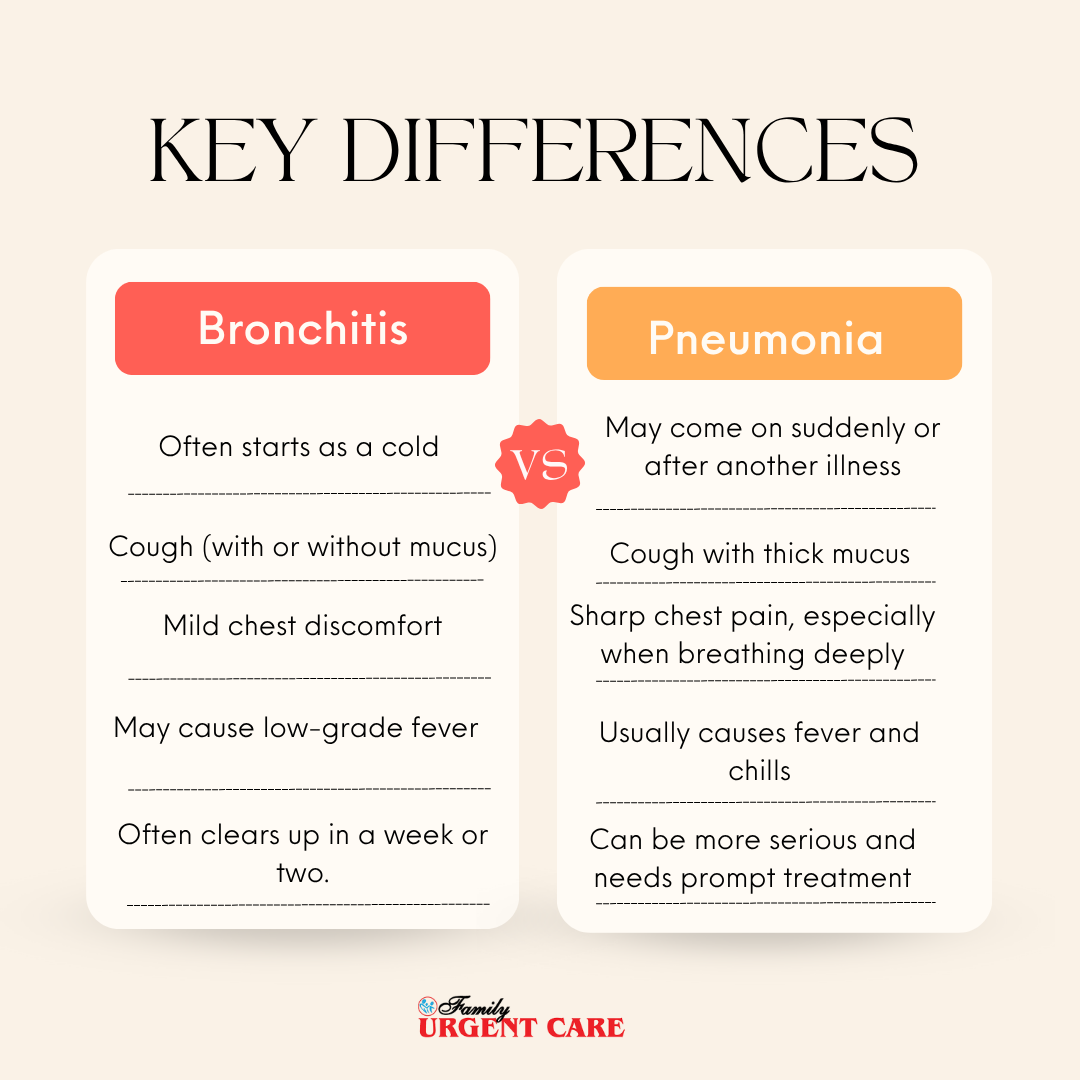Fast and Effective Treatment for Bronchitis and Pneumonia at Family Urgent Care
I have been coughing for days.
Your chest feels heavy, breathing takes more effort and you’re starting to wonder if it’s something more than just a cold.
Bronchitis and pneumonia can feel very similar at first. But they affect the lung differently and may need different treatments.
At Family Urgent Care, we help patients who are unsure what’s going on.
Our experienced medical providers are here to listen, figure it out and help you start feeling better fast.
Can Urgent Care Diagnose Pneumonia and Bronchitis?
Yes. And we diagnose and treat such patients all the time.

Many patients come in with a lingering cough, chest discomfort, or just a gut feeling that something isn’t right. Our team knows how to spot the difference between a stubborn virus, bronchitis, or something more serious like pneumonia.
With a physical exam, in-house chest X-rays, and quick lab testing (when needed), we can diagnose your condition accurately and get you the treatment you need without delay.
Not sure what’s going on? Here are a few ways bronchitis and pneumonia can feel different.
General Symptoms Of Bronchitis & Pneumonia
Some symptoms of bronchitis and pneumonia are similar: cough, chills and shortness of breath. However, both are entirely different illnesses. Let’s explore some common differences between the two.

Do not worry if you experience any of these symptoms. We can help you treat and manage the disease by prescribing medicines and providing counseling on how to manage your symptoms.
Here’s how we can help you!
How Can Family Urgent Care Help In Managing Bronchitis Or Pneumonia?
Whether it’s bronchitis or pneumonia, we’ll help you get the answers and the relief you need.
Here’s how we take care of you:
- Listen to your symptoms: We take the time to understand what you’re feeling, from your cough and breathing patterns to your medical and lifestyle history.
- Examine with care: Our provider will gently check your lungs, breathing rate, and other signs to assess how serious the infection might be.
- On-site testing if needed: If we suspect bronchitis or pneumonia, we may run a chest X-ray, bloodwork, or sputum test. All tests are available in-clinic.
- Personalized treatment: Whether you need antibiotics, bronchodilators, or supportive care, we tailor the plan to your specific condition and symptoms.
- Home care guidance: You’ll leave with simple instructions, like breathing exercises and what to eat to support your recovery.
- Easy follow-up options: If symptoms don’t improve or you’re unsure about anything, you can book a quick video or phone check-in without coming back to the clinic.
We’re here to make breathing easier and your path to recovery faster.
How Long Does It Take To Heal From Pneumonia?
It depends on how severe the infection is but most people start to feel better within a week or two with the right treatment. That said, a full recovery can take longer, especially if you’re older, have other health conditions, or had a more serious case.
You might notice your energy levels return slowly, and the cough can linger even after the infection clears. That’s normal.
The key is getting diagnosed early, starting the right medications, and giving your body time to rest and recover. We’ll walk you through every step and help you know what to expect along the way.
When To Go To The ER For Pneumonia?
Sometimes pneumonia hits harder than expected and waiting it out isn’t an option.
If someone around you is gasping for air, running a dangerously high fever, or you notice their lips or fingertips turning a bluish colour, don’t hesitate. That’s your cue to call 911.
Same goes for chest pain that doesn’t ease up, a racing heartbeat, confusion, or throwing up so much they can’t keep anything down.
And if they’re coughing up blood or thick mucus? That’s a red flag, too.
In moments like these, trust your gut and act fast.
FAQ's
It’s not always easy to tell on your own. Both can cause coughing, chest discomfort, and fatigue. But there are a few key differences: bronchitis usually starts after a cold and feels more like a lingering, annoying cough, while pneumonia often comes with fever, chills, and deeper chest pain, especially when breathing.
If your symptoms are sticking around, getting worse, or just feel “off,” don’t wait. We can help figure out exactly what’s going on and start the right treatment.

